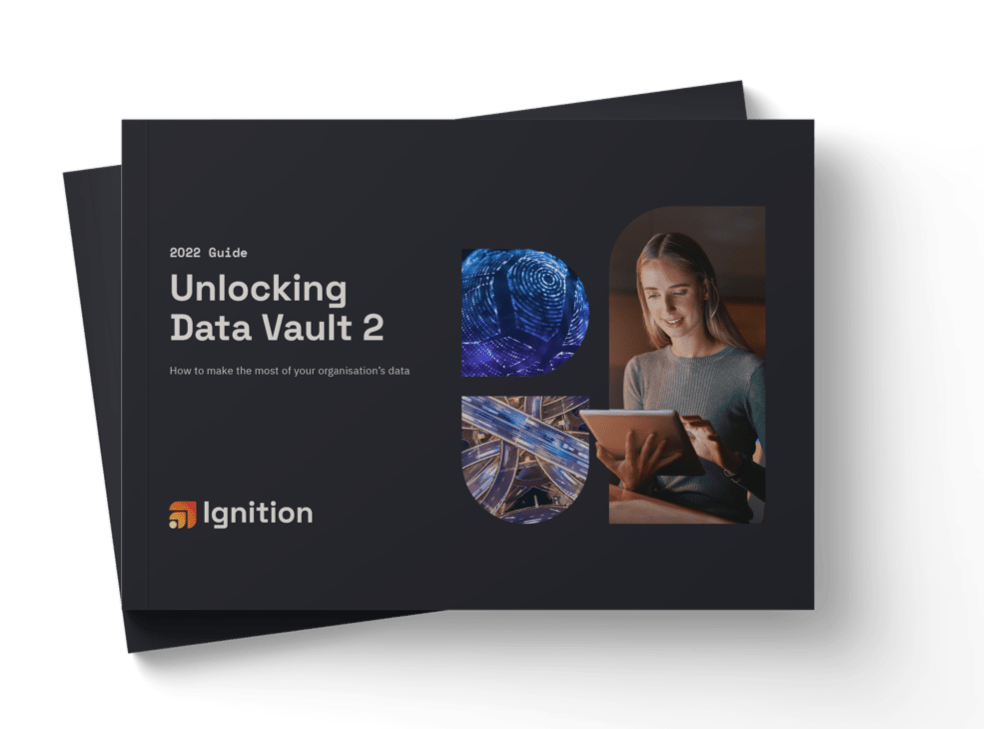The Ultimate Guide to Data Vault
Download the Free Data Vault eBook
Data Vault is a modern approach to enterprise data management that helps organisations unlock the true potential of their data. Whether you’re a CIO, data architect, engineer or analytics leader, this free guide will show you how Data Vault can transform the way you manage, govern, and use data.

What is Data Vault?
Data Vault is a proven information management methodology designed for scale, automation, and agility. It enables organisations to integrate new data sources quickly, deliver insights in days instead of months, and maintain full governance and auditability without costly re-engineering.
- Scalable: Handles enterprise and petabyte-scale data with ease.
- Agile: Adapts quickly to change, supporting fast delivery of reports.
- Trustworthy: Ensures data integrity and governance end-to-end.
- Cost-effective: Cuts ownership costs by up to 75% compared to traditional warehouses.
Download the eBook to learn more about Data Vault
Why you need this eBook
Whether you’re just getting started with Data Vault, are a seasoned pro or just curious about the methodology, this complete guide to Data Vault will provide everything you need to understand, apply and optimise Data Vault in your organisation. Inside the eBook you will find:
An in-depth overview of the Data Vault methodology
Learn how Data Vault helps overcome the roadblocks companies face when adapting to rapid change and how the methodology can help you capture the true potential of your data.
Speed up delivery with Data Vault automation
Automate your Data Vault delivery. Discover how Data Vault automation tools eliminate manual scripting, accelerate delivery, and reduce risk.
Data Vault and Modern Data Platforms
Learn how the integration of Data Vault into modern data platform architectures offers a powerful advantage for businesses aiming to enhance their data management capabilities and leverage advanced AI applications.
DataOps in practice
Understand how Data Vault aligns with the DataOps manifesto to enable continuous delivery, rapid experimentation, and quality analytics.
Practical resources and support
Access Data Vault Q&A videos, on-demand webinars, training, mentoring, user communities and more.
Real-world case studies
See how organisations like RESIMAC, MLC Life Insurance, Macquarie Group, and Robert Walters successfully adopted Data Vault.
Frequently Asked Questions
Data Vault is a modern data management methodology designed for agility, scalability, and auditability. Unlike traditional warehouses that struggle to adapt to change, and Data Lakes that lead to reduced quality and lack of governance, Data Vault separates raw, historical data from business logic, making it easier to evolve over time.
Download the eBook to learn the core principles and see why organisations are moving to Data Vault.
Star schemas and 3NF models are great for specific use cases, but they often lack flexibility when business requirements change. Data Lakes capture data but can quickly become ungoverned and unreliable. Data Vault combines the strengths of these approaches—structured, governed, and flexible enough to adapt as your business evolves.
The eBook explains when Data Vault makes sense and how it compares to other approaches.
You can build Data Vault manually, but it is time-consuming and prone to inconsistency. Automation tools accelerate delivery, enforce standards, and reduce errors—making them the preferred approach for most organisations.
The eBook covers the role of automation and how it impacts speed and quality.
Think of Data Vault as the foundation for a reliable, future-proof data platform. It allows you to quickly integrate data from multiple sources in an incremental way based on value driven use cases. It easily adapts to changes maintains auditability and makes it easier to delivery trusted business insights.
The eBook includes simple explanations and lists the benefits of Data Vault for both technical team and business users.
You do not need to wait months or years to see results. Many organisations begin delivering new data products within weeks, while building a foundation that scales long-term.
The eBook outlines how Data Vault accelerates time-to-value without sacrificing governance.
Data modelling fundamentals are important, but teams do not need to become experts overnight. With the right training and tooling, most data engineers and architects can get productive quickly.
Download the Data Vault eBook to access resources, including training, mentoring, and user communities.
Governance is built in. Every record in a Data Vault model is fully auditable and traceable back to its source, making compliance with regulations like GDPR and HIPAA much easier.
The eBook shows how Data Vault strengthens governance while keeping data accessible.
Data Vault is not a competing idea—it complements these architectures. It provides the modelling and governance layer that makes Data Mesh, Medallion Architecture, Data Lakehouse, or Fabric implementations more robust and sustainable.
Download the eBook to see how Data Vault fits into modern data strategies.
Typical pitfalls include over-engineering, ignoring business keys, and trying to model everything at once. Starting small and following proven patterns is key.
Download the eBook to learn how to avoid these common mistakes.
Data Vault 2 follows agile principles. It enables continuous delivery, parallel loading, rapid iteration, and clear governance, all of which are core to the DataOps manifesto.
Download the eBook to learn more about Data Vault and DataOps.
Tools like Ignition’s Data Vault automation software IRiS accelerate code generation, eliminate manual scripting, and integrate seamlessly with Azure, Databricks, and Snowflake.
You will find a full section about Data Vault automation in the eBook.
Yes. Its graph-style modelling supports complex data relationships, making it ideal for training AI models and powering advanced analytics.
Download the ebook to learn more about Data Vault, modern data platforms and AI.
Free Download
Download your free guide to Data Vault
Learn how leading organisations are using Data Vault to deliver agile, scalable, and trustworthy data management.
.png?width=676&name=Ignition_img_Data%20Vault%20eBook-min(2).png)